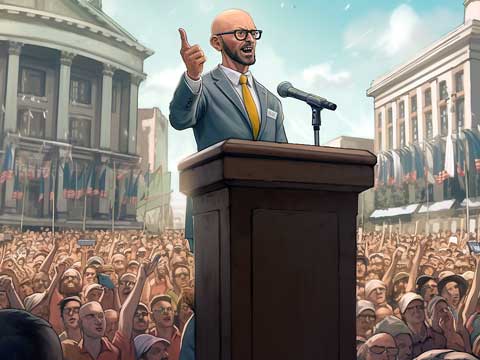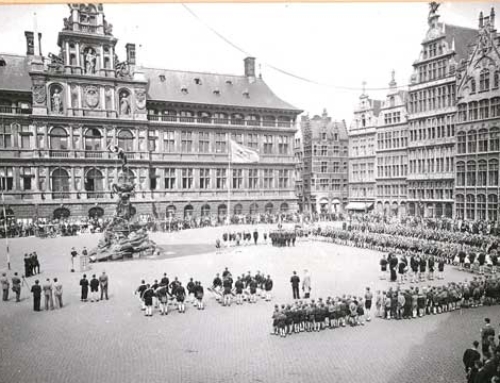Have you ever wondered why far-right politics are on the rise nowadays? It feels like we’re experiencing a déjà vu of dark times from the past. Dirk Verhofstadt*, a sharp Belgian thinker, draws parallels between today and the rise of Nazism. Trust me, this isn’t a dry history lesson, but a wake-up call we can’t ignore.
Historical Parallels: More Than a Faint Echo
Let’s rewind to the 1930s. The rise of Nazism wasn’t a bolt from the blue. There were psychological and societal factors that created the perfect breeding ground. Think of the Great Depression, an economic crisis that plunged millions worldwide into poverty. People were desperate and looking for a scapegoat. Jews were often labeled as such, a claim fueled by age-old prejudices and anti-Semitism.
Fear of the unknown also played a significant role. The world was changing rapidly, and many felt uncertain about their future. The Nazis capitalised on this by creating an enemy image and offering simple solutions to complex problems. They promised stability and the restoration of national pride, which many Germans found attractive in a time of chaos and uncertainty.
Sound familiar? Today, we see similar trends. Look at the rise of figures like Marine Le Pen in France, Geert Wilders in the Netherlands, or other populist political parties within the EU.
They all play on fear and uncertainty, often focusing on immigration and the perceived threat of Islam. In the United States, we saw how Donald Trump built an entire election campaign around the idea of building a wall to keep out ‘illegal immigrants.‘
These far-right leaders present themselves as the saviours who will protect the ‘real people‘ from everything foreign. It’s a dangerous cocktail of nationalism, xenophobia, and simplism. They offer seemingly simple solutions to complex problems, such as closing borders or deporting certain population groups. This kind of rhetoric often resonates with people who feel threatened by globalization and cultural changes.
History teaches us that giving in to these fears and prejudices can lead to tragic consequences. That’s why it’s important to remain critical and not get carried away by simplistic and dangerous ideas.
The Dangers of the Far Right to Democracy: Not Just Paranoia
You might think, “It won’t come to that.” But take a good look around. In various countries, the far right has already impacted democratic institutions. Take Poland and Hungary, for example. There, we see how governments are putting pressure on the independence of the judiciary. In Poland, a controversial reform of the judicial system was implemented, leading to major concerns about the separation of powers. In Hungary, Viktor Orbán has a firm grip on the media, the judiciary, and education, shrinking the democratic space.
And remember the storming of the Capitol in the U.S. on January 6, 2021? That wasn’t an action movie, but bitter reality. Supporters of then-President Donald Trump tried to prevent the certification of the election results. This was a shocking attack on the foundations of American democracy.
These movements undermine the principles of democracy and human rights. They don’t just want to play according to the rules of democracy; they want to change the game so they always win.
Look at Turkey, where President Erdoğan, after the failed coup in 2016, fired or arrested thousands of judges, teachers, and civil servants. Or Brazil, where Jair Bolsonaro openly expresses his admiration for the military dictatorship that ruled the country until the 1980s.
These are not isolated incidents but signs of a global trend where authoritarian leaders push and cross the boundaries of democracy. They use fear and division to consolidate their power, often at the expense of minorities and fundamental freedoms.
And that’s a dangerous path. If we’re not careful, we could end up in a world where the people’s voice is suppressed, where freedom of expression is restricted, and where individual rights are trampled. That’s why it’s so important to remain vigilant and speak out against these anti-democratic tendencies. Because democracy is not a given; it’s something we constantly have to fight for.
Vigilance Required – History as a Compass for the Future
It’s time to really wake up and learn from history. The far right is not an innocent trend. It’s a threat to the values our society is built on. The lessons from the past are clear: when extremism prevails, the consequences are devastating. Let’s defend our democratic values and not allow history to repeat itself.
But how? By staying critical, by asking questions, by informing ourselves. By not looking away when freedoms are threatened, but rather raising our voices. By not remaining silent when hate and division are sown, but rather engaging in dialogue. By not standing alone, but working together to build a society where everyone feels at home.
So, what do you think? Is it time to take action? Only together can we make a difference. Your voice counts, your actions have an impact. Let’s collectively watch over our democracy, our freedom, our future.
*Dirk Verhofstadt is a Belgian social liberal theorist and younger brother of former Belgian Prime Minister and former ALDE European Parliament Leader Guy Verhofstadt. He has a keen interest in political philosophy, and his philosophical outlook is influenced by Karl Popper, John Stuart Mill, Cesare Beccaria, Thomas Paine, Amartya Sen and Martha Nussbaum.







